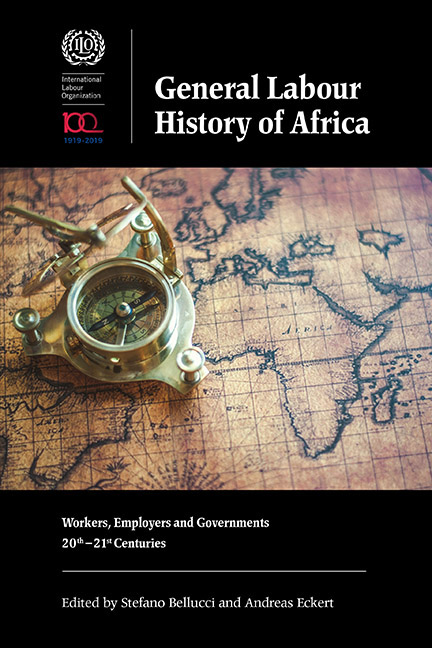Book contents
- Frontmatter
- Contents
- List of Maps and Figures
- List of Tables
- Notes on Contributors
- Foreword
- Acknowledgements
- The ‘Labour Question’ in Africanist Historiography
- Part I Free and Unfree Labour
- Part II Key Sectors
- 4 Agriculture
- 5 Mining
- 6 Industry and Manufacturing
- 7 Transport
- Part III International Dimensions and Mobility
- Part IV Varieties of Work
- Part V Entrepreneurs and Self-Employment
- Part VI The State, Unions and Welfare
- Part VII Conclusions
- Select Bibliography
- Index
5 - Mining
from Part II - Key Sectors
Published online by Cambridge University Press: 21 September 2019
- Frontmatter
- Contents
- List of Maps and Figures
- List of Tables
- Notes on Contributors
- Foreword
- Acknowledgements
- The ‘Labour Question’ in Africanist Historiography
- Part I Free and Unfree Labour
- Part II Key Sectors
- 4 Agriculture
- 5 Mining
- 6 Industry and Manufacturing
- 7 Transport
- Part III International Dimensions and Mobility
- Part IV Varieties of Work
- Part V Entrepreneurs and Self-Employment
- Part VI The State, Unions and Welfare
- Part VII Conclusions
- Select Bibliography
- Index
Summary
[T]he integrity with which … black migrant working men, disciplined and controlled, … retained their senses of identity, measuring them not only against those of the white men who employed them, and those who supervised them but also against those of black officials in the compounds and black supervisors underground. Migrant masculinity was sustained in solidarity with fellow mineworkers and in partnership with women and other men at home.
Dunbar Moodie and Vivian NdatsheThe paradox of Africa's mineral (and indeed, natural resource) wealth, on the one hand, and the pervasive poverty of its people, on the other, remains a deep and oft-noted feature of its economic landscape.
United Nations Economic Commission for AfricaThe development of [the] coal industry did a lot to my village. But for the coal industry civilization would have not reached us as early as it had reached us. The coal industry initiated me into Ozo title. Now I am Ozo Samuel N. Onoh. I was able to train up my children, build good houses. We contributed money and built schools and churches.
Samuel N. Onoh, Miner, Enugu Government CollieryMineworkers are an important sector in the political economy of colonial and postcolonial Africa. In some areas, mining introduced wage labour. The miners in South Africa and elsewhere shaped the formation of African labour studies in the 1970s and 1980s. Miners are in the economic sector that attracts the most foreign capital and that lends itself to production systems familiar to Europeans. Industrial mining appears to draw upon ‘universal’ (i.e., European) processes of labour deployment and control. Mining impacts on the state in varied and numerous ways. It encouraged colonialists to intervene in the African home in ways that agricultural production would not allow, except in cases of mass relocations such as the Gezira project (Sudan) and the Office du Niger (Mali). With mining, the state ‘imagined’ that it could change the intricacies of African family life to push Africans into the ‘modern’ nuclear family. Policymakers felt that the conjugal family, with a male breadwinner and one housewife, was the key to social stability and a bulwark against working-class radicalism.
- Type
- Chapter
- Information
- General Labour History of AfricaWorkers, Employers and Governments, 20th-21st Centuries, pp. 151 - 176Publisher: Boydell & BrewerPrint publication year: 2019



